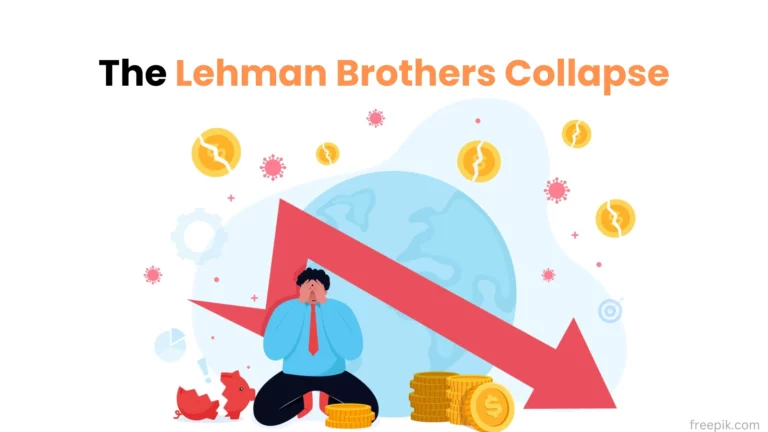Was the Lehman Brothers collapse wasn’t just another corporate failure or a global earthquake in the financial world?
‘Cause even now, years later, it’s still brought up in policy debates, business school lectures, and economic crisis documentaries.
But how did it all go down? Why didn’t anyone stop it? Could it have been avoided?
First, some quick background (no snooze fest, we promise).
Actually, Lehman Brothers wasn’t born as a giant.
It started in 1850 in Montgomery, Alabama, as a small general store by three German immigrant brothers.
But it took a century and a half to turn into a Wall Street titan with its massive presence in investment banking, wealth management, and trading.
It even co-led Macy’s IPO with Goldman Sachs back in 1906. That’s the level they were playing at.
By 2007, things were looking pretty golden.
Lehman posted a record net income of $4.2 billion. That’s billion with a B.
But as you probably know, those golden numbers were built on very shaky foundations, mainly risky bets on the housing market.
So, why did Lehman Brothers collapse?
To visualize it, imagine this: You’ve bought a bunch of stuff on your credit card, like cars, TVs, you name it, expecting your salary to keep growing and that you can always sell some of those items if needed.
Now imagine your salary tanks and nobody wants your used gear. You’re stuck with junk and no cash.
That’s basically what happened.
The firm had massive exposure to mortgage-backed securities (MBS) and collateralized debt obligations (CDOs).
Those complex financial products were supposed to be genius moneymakers. But when the housing market started tanking, it turned into financial quicksand.
By the time Lehman Brothers bankruptcy 2008 became official on September 15, 2008, the firm had $639 billion in assets and $619 billion in debt.
Think about that! More debt than most countries.
Here’s a practical tip if you’re in finance or business leadership: overleveraging is dangerous.
Lehman’s leverage ratio was 30:1. That means for every dollar they owned, they owed 30. Want a graph here?
Absolutely—showing Lehman’s leverage growth over time would hammer this point home.
What led to Lehman Brothers bankruptcy?
Three things:
- Overconfidence in real estate and financial engineering.
- Bad risk management decisions.
- The now-infamous Repo 105 accounting scandal.
Let’s unpack that last one because it’s a hot question: What was Repo 105?
In short, Repo 105 was a sneaky accounting maneuver where Lehman temporarily sold assets right before quarterly reports, just to make their balance sheet look healthier than it actually was.
They’d buy them back days later.
It wasn’t illegal per se, but it was shady as hell.
It’s like hiding your credit card bills under your mattress before your parents check your bank account.
According to the court-appointed examiner’s 2010 report, Repo 105 allowed Lehman to make its balance sheet appear $50 billion lighter than it really was.
That’s a serious deception.
Who was responsible for Lehman Brothers collapse?
Blame is a loaded thing. But leadership plays a big role.
Richard Fuld, Lehman’s CEO, later said, “I ran more of a ‘what do I really need to be focused on?’ mentality.” That’s… not super reassuring.
According to a former Lehman executive, Matthew Lee, when he tried raising concerns about the Repo 105 practices, he was shown the door. “[There were] serious, material accounting control and corporate governance issues,” he said in testimony (NYT).
So yeah, Lehman Brothers risk management was a disaster.
Their Chief Risk Officer reportedly had her warnings ignored.
Management was obsessed with keeping up with competitors like Merrill Lynch and Bear Stearns, also on the risky train.
You might be wondering, could Lehman Brothers’ collapse have been prevented?
Yes—maybe. Had regulators stepped in sooner or leadership been more cautious. And had someone actually stopped and thought, “Wait, maybe this house of cards isn’t built to last.”
But hindsight’s always 20/20, right?
Let’s zoom out a little: How did Lehman Brothers contribute to the 2008 crisis?
Oh, they were central.
The firm’s sudden crash sent a shockwave through the financial system. Banks panicked. Lending froze. Markets plummeted.
Surprisingly, within two weeks of Lehman’s bankruptcy, the S&P 500 fell nearly 17%. That’s the fastest drop since the Great Depression.
In fact, the 2008 financial crisis causes are intertwined with Lehman’s fall—reckless risk-taking, lack of transparency, weak oversight, and systemic greed.
What are your lessons from Lehman Brothers downfall?
First, transparency isn’t optional. If you’re using financial gimmicks to hide risk, it’s going to catch up to you.
Second, innovation in finance is always a good thing.
But Lehman Brothers innovation in finance—like heavy use of CDOs and synthetic products—seemed smart until it wasn’t.
There’s a thin line between innovative and irresponsible.
Third, culture matters. Lehman’s culture of overconfidence and “we’re too smart to fail” hubris blinded them.
If your risk team is being ignored, you’ve got a time bomb ticking.
And finally, leaders have to own their decisions. “I didn’t know” doesn’t cut it when billions of lives and livelihoods are affected.
Here’s a wild thought: what if you were analyzing your company like Lehman?
Ask yourself:
- Are you overly reliant on one revenue stream?
- Do you have realistic risk models?
- Do you empower your compliance and governance teams?
If not, start now.
The Aftermath
After the collapse, thousands lost their jobs. Investors lost billions. And the U.S. government had to scramble with emergency interventions like TARP (Troubled Asset Relief Program).
The Dodd-Frank Act came in 2010 with tighter regulations on banks. Stress tests, stricter capital requirements, and more transparency all trace back to the Lehman Brothers collapse.
But here’s something not everyone talks about:
Lehman’s fall changed the public trust in Wall Street.
It shifted political wind and triggered global regulatory reform.
And It also pushed fintech and alternative finance forward as people looked for safer, more transparent options.
So if you’re in finance, governance, or even running your own startup, this isn’t ancient history.
The echoes of Lehman are still guiding how we regulate, report, and react.
In summary, if someone ever asks, “Why did Lehman Brothers fail?” or “What was Repo 105?” or “What led to Lehman Brothers bankruptcy?”—now you’ve got more than a surface-level understanding.
And hey, if you’re in business or finance leadership today, don’t wait until it’s your own Lehman moment. Learn from them. Fix your blind spots before they break you.



